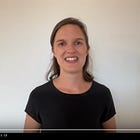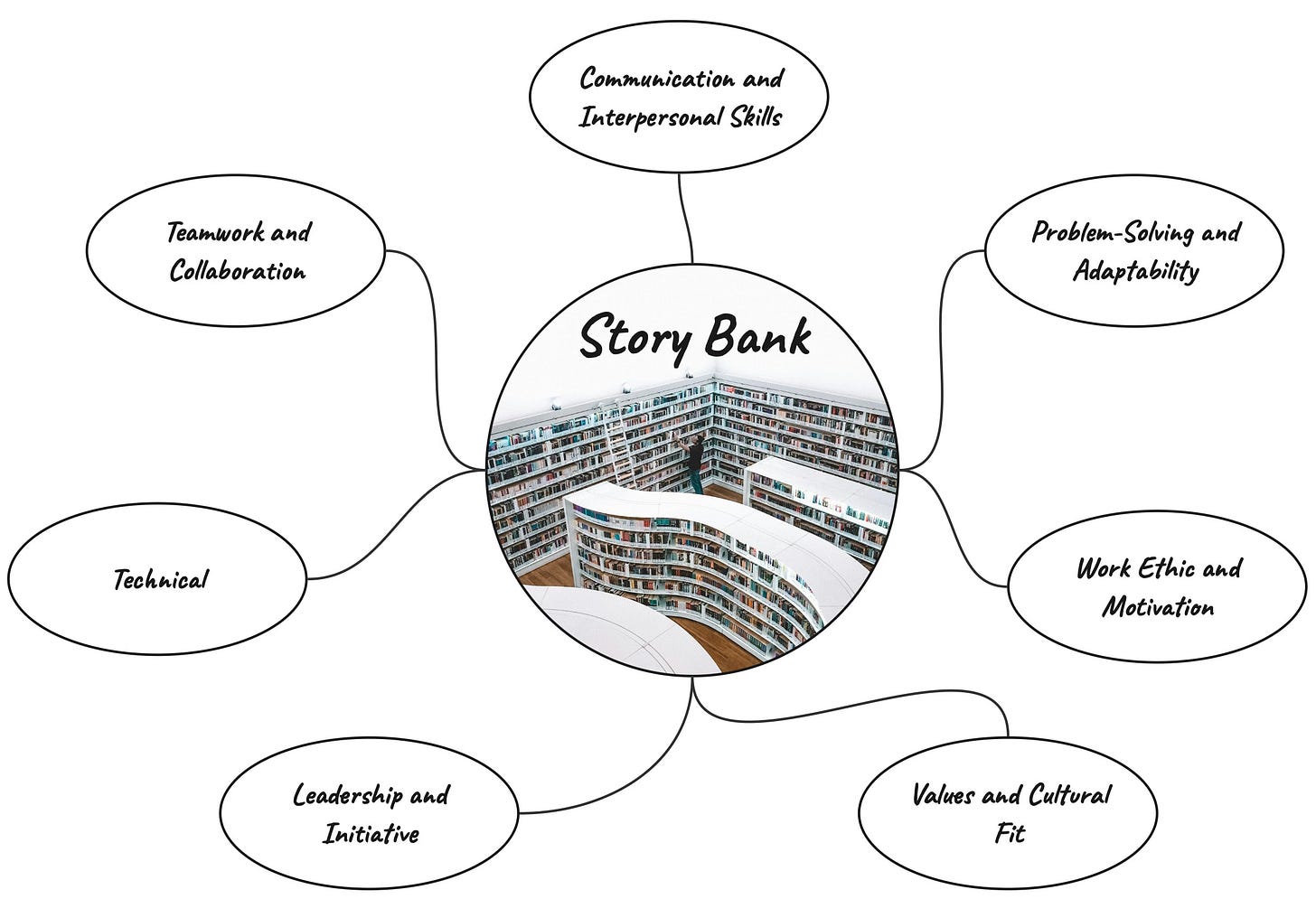Winning in a Competitive Job Market - Part 3: Story Bank Secrets
Your next interview is not about the question, it’s about your stories.
You’ve got the interview! Your CV made it past the Applicant Tracking System and that pitch video got you over the line.
Now it’s time to prepare for the interview. It can feel very daunting; this person on the other side of the table or on the screen is able to come up with any question they can possibly think of. And it’s true, they may ask you anything. Most likely though the questions will revolve around a few themes that I wanted to explore today. Because many interview questions are fairly predictable. They will very likely ask you, for example, to talk about why you want to join their organisation or how you worked as a team to achieve a goal.
We may not be able to predict the exact questions, however, I believe you don’t need to know the question beforehand. Keep reading if you like to find out why I think the question itself is actually not that important.
Before getting there, I’d first like to dive into the concept of the story bank, before identifying six themes that I believe have a very high likelihood of being discussed.
This is part 3 in the 3-part series: Winning in a Competitive Job Market. If you want to learn more about building your (online) brand and standing out in the application process you can find part 1 and 2 here:
The concept of the Story Bank
You have so many amazing stories about your achievements, how you had to show resilience and how you showed leadership. All those stories are somewhere in your head, however when under stress (for example in an interview) you may not remember them. Now, imagine a bookcase, but then in your head. A story bank is exactly that: a collection of your experiences, achievements and challenges that you've neatly organised in the bookcase in your head. I briefly referred to this concept in my very first Substack post as I use it for any kind of impromptu speaking opportunities.
Getting started is pretty simple: you start by collecting stories. This can be in a note, a Confluence page, a Notion page or whatever medium works for you. When starting out, you’ll need to invest some time into filling that blank page. You have to think back on some of your most memorable experiences that really showcase who you are and what you bring to the table. Once you have a few past stories written down, you can keep adding new ones and refining the old ones.
For me it works best to create a summary in bullet points. Because they are your personal stories, a few reminders will most likely be sufficient to recall the experience. When building a story bank for interviews, I recommend focusing on the STAR method:
Situation: start by setting the scene and briefly explaining the context.
Task: describe your responsibilities and tasks in that situation.
Action: explain the steps you took to address the task.
Result: share the outcome of your actions.
For other impromptu speaking occasions such as a panel discussion, you can think about incorporating a Call to Action for your audience. Or perhaps you want your audience to walk away with a lesson, something to think over a few more times in the days after your speech. If so, you should make it part of your story so it becomes part of your story when you share it. You can even make a separate story bank for when people ask you unexpectedly to share a story, for example at a networking event. Instead of rambling off your CV, you can then tap into more inspiring stories, for instance on something exciting that you’re working on at the moment or your goal for this year.
Common themes for interviews
The good news is that you don’t need 100 stories to create a story bank for your interview. I’ve compiled a list of seven themes that I think cover the most common questions:
Teamwork and Collaboration: focuses on your ability to work with others, resolve conflicts, and take on feedback.
Communication and Interpersonal Skills: assesses how well you express yourself, listen to others, and build relationships.
Problem-Solving and Adaptability: looks at how you approach challenges, make decisions, and adapt to change.
Work Ethic and Motivation: explores your drive, dedication, and how you approach responsibilities.
Values and Cultural Fit: evaluates alignment between your personal values and the company’s culture or mission.
Leadership and Initiative: highlights your ability to take charge, influence others, or step up when a project needs a clear leader.
Technical: focuses on role-specific requirements that are most likely mentioned in the job description.
What are some other themes or questions that you think have a very high likelihood of being covered in an interview? Share them in the comments!
It’s not about the question
It may come as a surprise when I say that the question is not really important. Let’s take the theme of problem-solving. The interviewer may come up with a variety of questions, such as:
Describe a time when you had to deal with an unexpected obstacle. How did you handle it?
Can you describe a challenging situation at work where you had to think quickly on your feet?
Have you ever identified an inefficient process at work? What did you do to improve it?
Describe a time when a solution you proposed didn’t work. What did you learn from it?
The list goes on—you get the idea. Once you have some really strong stories ready, it doesn’t really matter how the question is formulated. When you know that you have a great story ready, the question becomes irrelevant. The above four questions can be answered with the same story that you prepared on showcasing your problem-solving skills.
In my opinion this goes even further. Let’s say you get a question that you didn’t have a story prepared for, perhaps even about something that you don’t have any experience in. Your mind goes blank trying to come up with a good answer but nothing is popping into your head. Instead of getting nervous and admitting that you’ve never encountered such a situation, in my opinion it can be stronger to share a related story in a confident way. Most likely there are overlapping skills you showcased in that situation and lessons that you learned from it.
I hope this provided a fresh perspective on the interview stage. Let me know if you’re trying out the story bank! And if you’d like more personalised help, feel free to have a look on my website sheisbrava.com to see how we can work together.
This is part 3 in the 3-part series: Winning in a Competitive Job Market. If you want to learn more about building your (online) brand and standing out in the application process you can find part 1 and 2 here:
What’s next
In my last newsletter of the year I’ll reflect on the year that has been and I’ll share an Annual Theme exercise I’ve been doing and that could inspire you for 2025.





Hi Yvette, selfreflection is also an important one. Not just try to sell yourself by sharing how wonderful you were in certain situations or with certain things but also be transparent on where it was difficult (but you still managed). Be honest and authentic because it will create trust.
At the beginning of the year, such a great reminder ! 🙏